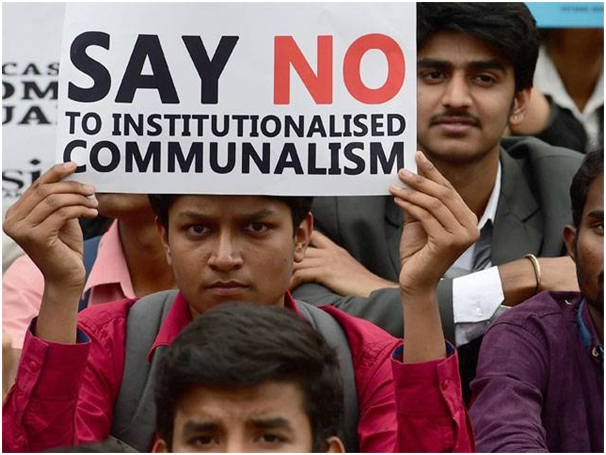Where Did Political Interference in HCU Really Begin?

HYDERABAD: The incident of Rohith Vemula’s suicide at the Hyderabad Central University, and the touching philosophical note that he he has written engendered a global protest. The central Government is trying to project it as an accident that got politicized by the opposition parties.
Congress vice President Rahul Gandhi’s two visits, particularly the January 30 sit in with the students on the hunger strike is being projected as a deliberate politicization of the issue. To have a clear understanding one must understand where the political interference started. We, therefore, must carefully look at the letter written by the Union Labour Minister Mr.Bandaru Dattatreya to the minister of Human Resource Development Smriti Irani.
The letter addressed by him to Smriti Irani reads:
“As you are aware, I represent Secunderabad in Parliament which constitutes a major part of Hyderabad. Hyderabad University, a central University located in Hyderabad has, in recent past, become a den of casteist, extremist and anti-national politics. This could be visualized from the fact that when Yakub Menon (sic not Memon) was hanged, a dominant student union that Ambedkar Student Association has held protests against the execution. When Shri Shushil Kumar, president of ABVP in the campus protested against this, he was manhandled and as a result he was admitted in the hospital. What is more shocking is that the university administration has become a mute spectator to such events...”
The Minister’s claim after Rohith’s death that he did not write any letter, and that he just forwarded somebody’s representation is not correct. The above is not a forwarding letter but it a letter written for serious consideration of the HRD minister herself.
Secondly, the content of the letter is about the law and order problem not about labour related issues like wages, recruitments and so on, of the university employees that alone should concern the HRD Ministry.
Why did the ABVP get the letter written by Dattatreya, a Minister at the centre? Even if the BJP’s student wing wanted to circumvent the local administration, the MP of the Chevella constituency where HCU is located, is Konda Vishweshwar Reddy of the Telangana Rashtra Samithi.
If the law and order problem was so serious as stated in the letter, Dattatreya should have written this letter to the Telangana Home Minister. Why has this letter gone to the HRD Minister? The contents of the letter are purely about tackling the law and order issues. It just does not talk about any protest about the Yakub Memon hanging. It informs Irani that the HCU has become “a den of casteist, extremist and anti-national politics”. In fact the letter reads like an intelligence report.
The Minister, ignoring all moral responsible, did not take an impartial view of student activities but acted like a karyakartha of the Bharatiya Janata Party, who was working to strengthen its student wing—the ABVP on the campus. Did any other ruling party minister in the past—be it the Congress or any other party—write letters on such law and order issues to the HRD Ministry or to the Home ministry? There is no evidence.
Assuming that the Ambedkar Students Association activists were extremists and anti-nationals, assuming that they had guns and bombs with them what should the ABVP done? It should have gone to the police authorities of the state Government. Even if the protest against Yakub Memon’s hanging was anti-national, as the letter of the minister claims, the complaint should have gone to the police of the state not to the HRD Minster.
The Ministry has written several letters asking the University authorities for an action taken report, naturally against the so called extremists and anti-nationals of ASA. The consequences of this pressure is now known to the entire country.
The question here is what kind of inter-departmental letter writing should take place between different ministries, which is a natural course of administration. It normally would be about the issues concerning that particular ministry. In this case Dattatreya by completely erasing ministerial neutrality politicised an ordinary quarrel between two student organizations. This lead to Rohith Vemula’s suicide.
As a teacher with more 38 years teaching experience, in both state (Osmania) and a central university (MANUU), I feel this kind of political interference has huge implications for higher education.
When one minister writes to the other on issues like this all enquiries are bypassed. Here Dattatreya has vouched for his version, as the truth. And it was not an issue of higher education standard, syllabus or an injustice in appointment, or of wages of contract labour and so forth.
The ministries and the Indian parliament must address this issue. Now that Rohith has left a moving suicide note and that too he died in the process of their struggle for justice after expulsion, the issue has rocked the nation. There has to be a debate about the moral responsibility of ministers. And about the complex forms of discrimination that can kill young brains that otherwise could produce knowledge that this country and the world could prosper with.
(Professor Kancha Ilaiha is the Director, Centre for the Study of Social Exclusion and Inclusive Policy, Maulana Azad National Urdu University, Hyderabad)



